Microsoft Advertising listens: Your feedback for the first half of 2019
At Microsoft Advertising, our mission is to work with each of you to identify opportunities and solve business challenges. Listening to you, our clients, and solving the problems that are most important to you, is at the heart of this mission. We review feedback that you've shared on our UserVoice feature suggestion forum, and through other listening forums and use these ideas to continually improve our product.
Thank you for partnering with us to reshape Microsoft Advertising.
The first half of 2019 has been exciting. Lots of product improvements and exciting platform announcements — we celebrated 10 years of Bing, Bing Ads became Microsoft Advertising and we announced a strengthened partnership with Verizon Media.
Over this period, we also made several improvements based on your valuable feedback that we are confident will help you take your existing campaigns to the next level; especially with the holiday season right ahead. Here are the benefits we’ve delivered on:
The flexibility of ad customizers allows you to surface any text you’d like. You can change ads based on an array of targeting options within the feed, including, but not restricted to, location, audience lists, device, search queries, time of day and others.
For example, to modify ad text based on user location you can create a feed with Target Location attribute:
The ad copy can be structured like this:
{=Deals.Product}
www.contoso.com
Get {=Deals.Promo} for limited time.
Buy now for only {=Deals.Start_price}
When someone is looking for “Contoso Vacuum Seattle” or is physically based in Seattle looking for “Contoso Vacuum” they will see:
Contoso 16V Vacuum
www.contoso.com
Get 20% off in our Seattle locations for a limited time.
Buy now for only $80.00
Default values ensure you always show an ad even when a feed item is not selected. The default values are optional, but they are highly recommended.
Google Import tool is available to easily import ad customizer feeds and ads you are currently running in Google Ads to make the set-up much easier in Microsoft Advertising. You can schedule your Google import to ensure your ad customizer feeds have the most recent updates.
Currently, you can create and manage feeds via Feed Management Tool in the UI, Google Import tool, and integration with our bulk API. In the coming months, we'll also provide the ability to schedule feed uploads from a URL. Check out our ad customizer help page for more examples and details on ad customizers in Expanded Text Ads.
For more information about using Target Audience ID and setup, visit our blog post of this feature.
To get started with campaign-level associations:
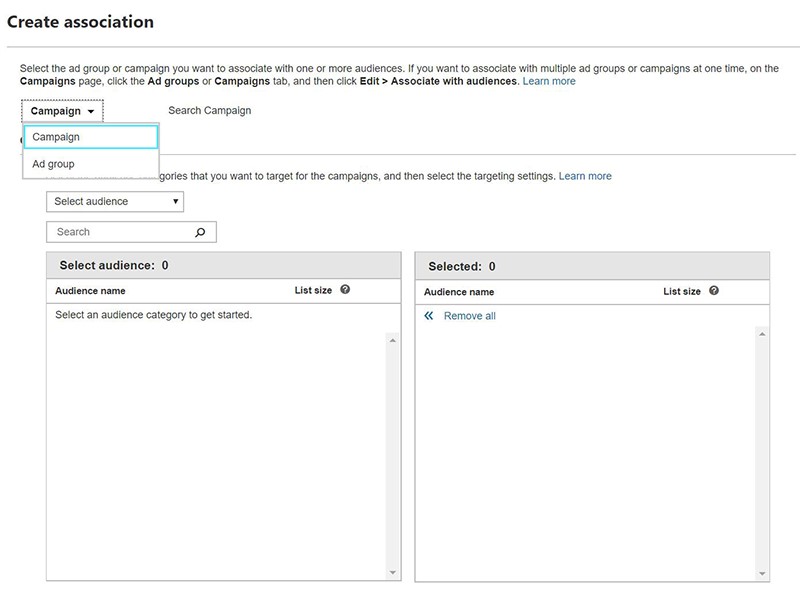
Select Campaign from the menu.
It works with all audience targeting features, such as Remarketing, In-market Audiences and Custom Audiences.
In the Choose import options window, you can now select specific items to import, and you have the ability to adjust your Bids and budgets, and Landing page URLs. You can also specify settings for targeting and ad extensions and modify Tracking templates. Now that your campaigns import directly into the server and your updates go live automatically, you’ll save a lot of time and you won’t need to manually post your changes. However, you still can pause newly imported campaigns to review them before going live.
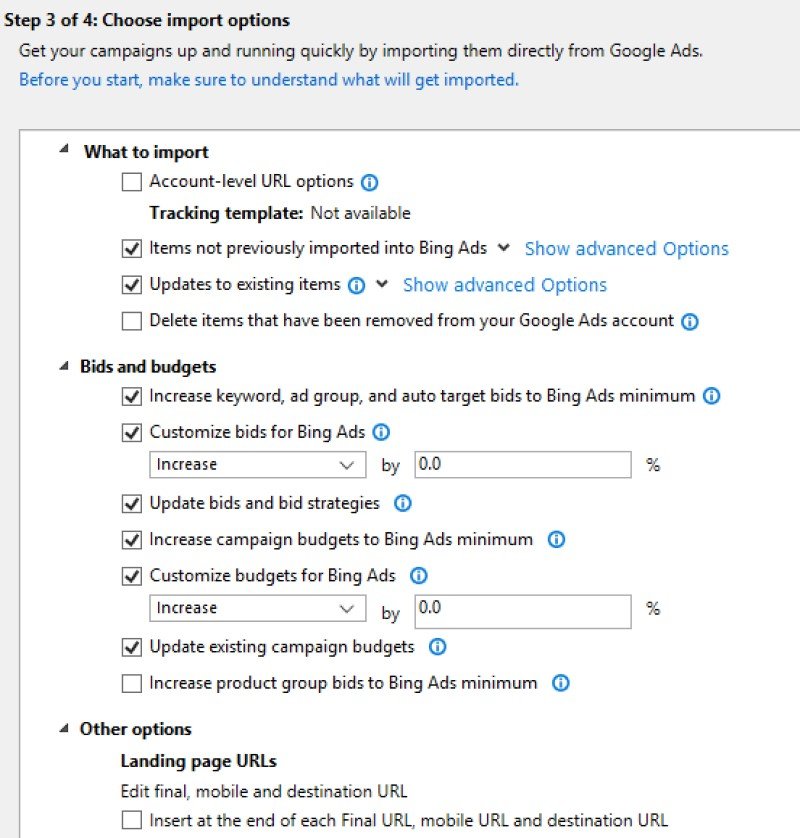
The Choose import options window gives you flexible control.
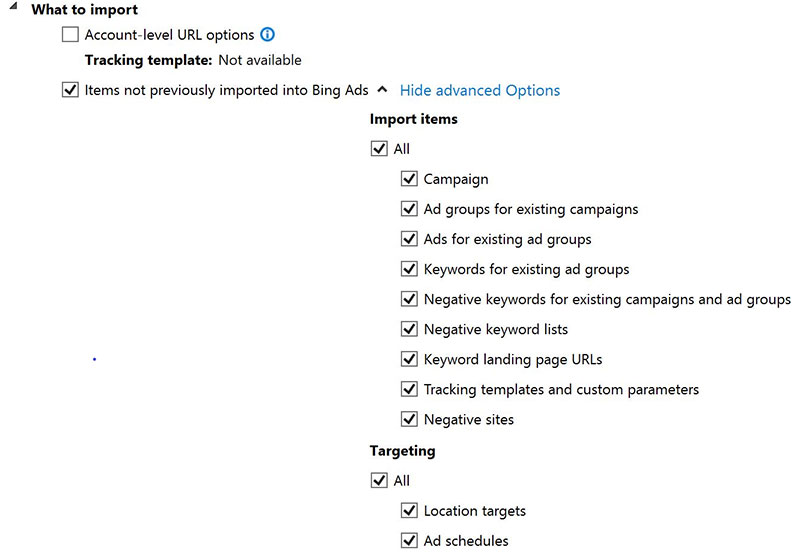
You can select exactly what you want to import and what you want to leave out.
You can schedule your import for a later time or date on a recurring basis: daily, weekly, or monthly. While the import is in progress, you can view the history and status at any point.
An experiment is a duplicate version of your campaign that provides you with a controlled environment to monitor a change without fully launching it across your whole campaign. This way, you can run a true A/B test within a campaign to determine whether a particular update will work well for you and your business. Some examples include:
Before you set up any kind of experiment, have a clear hypothesis and goal in mind. Once you’re set on what you want to test, navigate to the Experiments tab on the Campaigns page and select the campaign you want to experiment on.
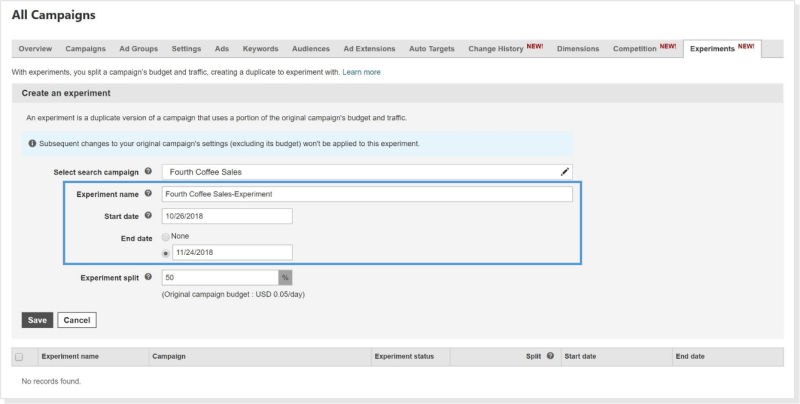
The Create an experiment window on the Experiments tab.
Once you select a campaign, you can use whatever Experiment name you'd like, along with a Start date and End date (if desired). Then you set your Experiment split, which is the percentage of the original campaign’s daily budget and ad traffic that you want to allocate for this experiment. For you to get enough volume quickly and make the comparisons more easily, we recommend setting your experiment split at 50%.
After you create the experiment (i.e. duplicate campaign), make sure that it was successfully created with no errors by checking the Experiment status. You now have your original campaign and experiment campaign.
Action Extensions are available in all Microsoft Advertising markets on both PC and mobile devices. Advertisers across many verticals can leverage up to 70 pre-defined Action Extensions in all Microsoft Advertising supported languages (English, German, French, Spanish, Italian, Portuguese [Brazil], Dutch, Swedish, Traditional Chinese, Danish, Finnish, and Norwegian).

PC layout
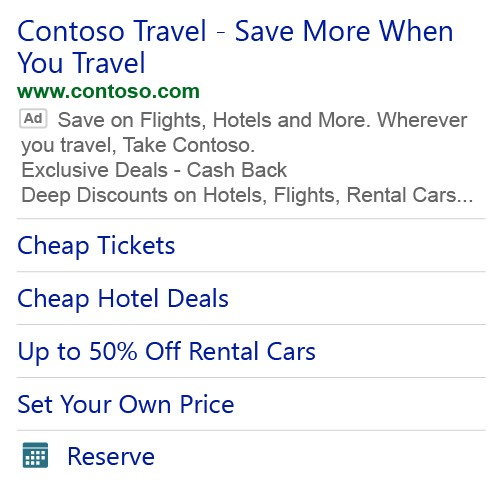
Mobile layout with an Action Extension and sitelinks
Key details about Action Extensions:
Based on the inventory information submitted by the retailer, when a customer is near a retailer’s physical store location and searches for a product carried by the retailer, we show the ad with an In store notification. When the ad is clicked, we can direct the customer to the retailer’s omnichannel store front to find information like the store location, product availability and more, or the customer can be sent to a Bing hosted store front displaying similar information:
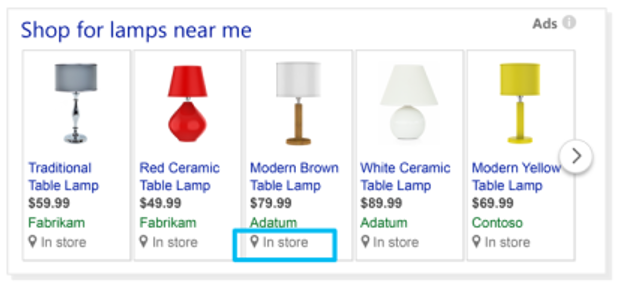
You can set up Local Inventory Ads in 5 steps:
These metrics are:
These prominence metrics can now be viewed in the Campaign, Ad Group and Keyword tabs.

Columns showing new prominence metrics.
Adding these new metrics and removing some metrics, like impression share lost to bid, relevance, and expected CTR, brings us closer to Google parity with one exception. One key metric that will remain in your reporting is average position, as we’ve heard continuous feedback that shows this information is still very valuable to you.
A new preview bar surfaces the highest priority notification and invites you to open the notification queue.

The preview bar floats above the menu bar.
The new notification queue shows you all your notifications in one place, prioritized to help you focus on what needs your attention first. You can easily and quickly act on each notification, directly from the queue. We also keep your experience clean by consolidating the same notification across multiple accounts and giving you a link to see the details in the new notifications grid.
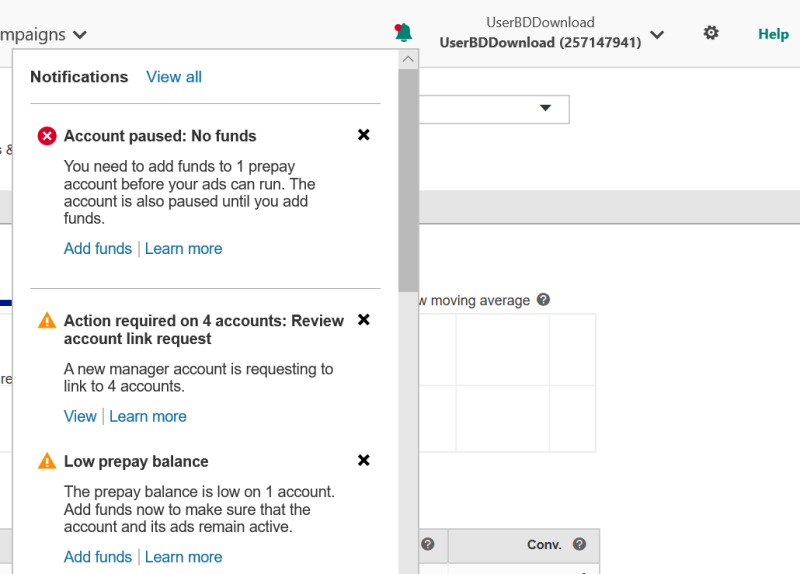
Notification queue, displaying priority notifications.
The notifications grid shows you all your notifications, with filtering capabilities that help you organize the notifications across severity, category, notification type and account. Here too, you can directly act on the notification.
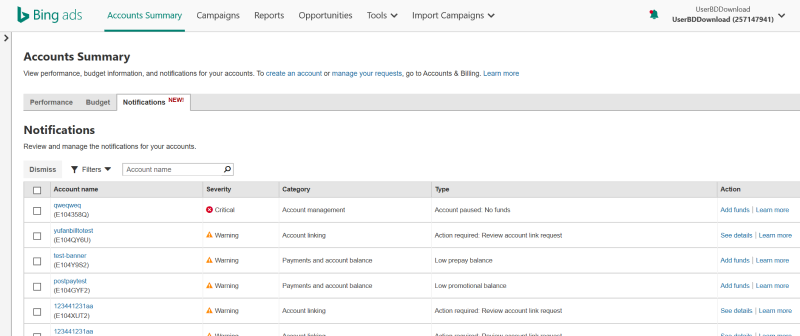
Notifications grid tab on the Accounts Summary page.
In addition to these new capabilities, we have also cleaned up your current notifications experience.
We hope that the rich new notification experience will help you stay up to date with all your accounts much more easily.

The Billing tab, displaying information about payment status.
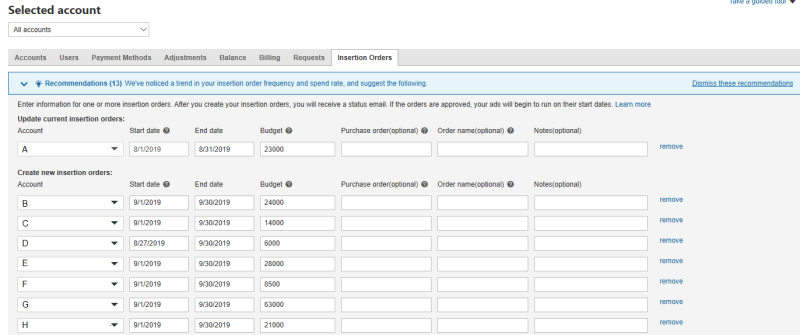
The Insertion Orders tab, with editable fields.
Thank you for being a Microsoft Advertising client and for making these and other great suggestions on how to improve Microsoft Advertising to meet your marketing goals. We look forward to receiving more of your suggestions in our UserVoice feature suggestion forum, and to continue sharing product improvements based on your feedback.
SEO Company in lucknow
Thank you for partnering with us to reshape Microsoft Advertising.
The first half of 2019 has been exciting. Lots of product improvements and exciting platform announcements — we celebrated 10 years of Bing, Bing Ads became Microsoft Advertising and we announced a strengthened partnership with Verizon Media.
Over this period, we also made several improvements based on your valuable feedback that we are confident will help you take your existing campaigns to the next level; especially with the holiday season right ahead. Here are the benefits we’ve delivered on:
- Better tools to help improve effectiveness and save time
- Test your campaign changes with confidence
- Drive customers to immediate action
- Get clearer insights on ad performance with prominence metrics
- Multi-account management with clear, contextual, actionable notifications
- Making it easier to fix any payment problems
- Keeping your accounts healthy with AI-powered insertion order recommendations
Better tools to help improve effectiveness and save time
Improving ad effectiveness with ad customizers
Ad customizers help reduce setup time and improve ad quality by allowing you to create hundreds of different ad variations with just one ad copy. Ad customizers are parameters within the ad copy which get replaced by dynamic text when the ad is displayed for the user. The text values are provided in the feed file and they are selected based on the targeting defined in the feed. The parameters in the ad copy follow this format: {=FeedName.AttributeName: Default}. If your feed name is “Deals” and you want to reference the custom attribute “Product (text)”, the parameter would be {=Deals.Product}.The flexibility of ad customizers allows you to surface any text you’d like. You can change ads based on an array of targeting options within the feed, including, but not restricted to, location, audience lists, device, search queries, time of day and others.
For example, to modify ad text based on user location you can create a feed with Target Location attribute:
Product (text)
Promo (text)
Start_price (price)
Target location
Contoso 16v Vacuum
10% off in all our stores
$90.00
United States
Contoso 16v Vacuum
20% off in all our stores
$80.00
Seattle, Wa
The ad copy can be structured like this:
{=Deals.Product}
www.contoso.com
Get {=Deals.Promo} for limited time.
Buy now for only {=Deals.Start_price}
When someone is looking for “Contoso Vacuum Seattle” or is physically based in Seattle looking for “Contoso Vacuum” they will see:
Contoso 16V Vacuum
www.contoso.com
Get 20% off in our Seattle locations for a limited time.
Buy now for only $80.00
Key details about ad customizers
Ad customizer parameters can be referenced in all parts of Expanded Text Ads except for the URL field.Default values ensure you always show an ad even when a feed item is not selected. The default values are optional, but they are highly recommended.
Google Import tool is available to easily import ad customizer feeds and ads you are currently running in Google Ads to make the set-up much easier in Microsoft Advertising. You can schedule your Google import to ensure your ad customizer feeds have the most recent updates.
Currently, you can create and manage feeds via Feed Management Tool in the UI, Google Import tool, and integration with our bulk API. In the coming months, we'll also provide the ability to schedule feed uploads from a URL. Check out our ad customizer help page for more examples and details on ad customizers in Expanded Text Ads.
For more information about using Target Audience ID and setup, visit our blog post of this feature.
Saving time with campaign-level associations
The campaign-level association helps apply and manage audience associations at the campaign level, so you no longer need to apply the audience targeting to each of the ad groups and then change each individual bid boost. With a click of your mouse, you can swiftly apply your audience targeting to all ad groups in the campaign.To get started with campaign-level associations:
- On the Campaigns page, click the Audiences tab.
- Click Create association.

Select Campaign from the menu.
It works with all audience targeting features, such as Remarketing, In-market Audiences and Custom Audiences.
Saving time with Google Ads Import updates in Microsoft Advertising Editor
Importing campaigns from Google Ads is now easier and more effective for you. We’ve made the following improvements to Microsoft Advertising Editor:- Better mapping of campaigns with Google Ads to make imports more reliable.
- Same import and scheduling options as Microsoft Advertising online.
- Direct import of campaigns to the Microsoft Advertising server to save time, so you don’t have to review everything locally.
Customized import options
In the Choose import options window, you can now select specific items to import, and you have the ability to adjust your Bids and budgets, and Landing page URLs. You can also specify settings for targeting and ad extensions and modify Tracking templates. Now that your campaigns import directly into the server and your updates go live automatically, you’ll save a lot of time and you won’t need to manually post your changes. However, you still can pause newly imported campaigns to review them before going live.
The Choose import options window gives you flexible control.

You can select exactly what you want to import and what you want to leave out.
You can schedule your import for a later time or date on a recurring basis: daily, weekly, or monthly. While the import is in progress, you can view the history and status at any point.
Experiments: Test your campaign changes with confidence
Experiments allow you to test out campaign changes with full confidence; you get an understanding of a tested feature before applying to your campaign.An experiment is a duplicate version of your campaign that provides you with a controlled environment to monitor a change without fully launching it across your whole campaign. This way, you can run a true A/B test within a campaign to determine whether a particular update will work well for you and your business. Some examples include:
- Ad copy - If you want to test various messages and calls-to-action on your ads, you can try it out in an experiment and compare it to real performance.
- Landing page URLs - See whether different landing pages result in better performance for your campaigns.
- Bidding strategies and modifiers - Allocate a percentage of your campaign budget towards a smart bidding tactic like Maximize Clicks, or test out different bid adjustments.
Before you set up any kind of experiment, have a clear hypothesis and goal in mind. Once you’re set on what you want to test, navigate to the Experiments tab on the Campaigns page and select the campaign you want to experiment on.

The Create an experiment window on the Experiments tab.
Once you select a campaign, you can use whatever Experiment name you'd like, along with a Start date and End date (if desired). Then you set your Experiment split, which is the percentage of the original campaign’s daily budget and ad traffic that you want to allocate for this experiment. For you to get enough volume quickly and make the comparisons more easily, we recommend setting your experiment split at 50%.
After you create the experiment (i.e. duplicate campaign), make sure that it was successfully created with no errors by checking the Experiment status. You now have your original campaign and experiment campaign.
Drive customers to immediate action
Action Extensions
Action extension allows you to highlight a clear call-to-action on your text ads to entice customers to immediately click and drive them to your website. Advertisers who participated in the beta have seen an average click-through-rate (CTR) increase of 20% when they served Action Extensions in their ads.Action Extensions are available in all Microsoft Advertising markets on both PC and mobile devices. Advertisers across many verticals can leverage up to 70 pre-defined Action Extensions in all Microsoft Advertising supported languages (English, German, French, Spanish, Italian, Portuguese [Brazil], Dutch, Swedish, Traditional Chinese, Danish, Finnish, and Norwegian).

PC layout

Mobile layout with an Action Extension and sitelinks
Key details about Action Extensions:
- Like sitelinks, clicks on Action Extensions will be charged the same cost-per-click (CPC) as clicks on the ad headline.
- Action Extensions can be shown with other ad extensions, including sitelinks.
- Action Extensions can be associated at the account, campaign, or ad group level, where the lowest level takes precedence. There is a limit of 20 associations per level.
- The URL fields are all optional. If the URL is not provided for the Action Extension, we will use the ad’s URLs (or the URL at the keyword level, if provided) as the landing page when the call-to-action button is clicked.
Local Inventory Ads
Local Inventory ads are an advertising format for your Shopping Campaigns. They allow you to showcase your products and local retail store information to nearby shoppers on Bing.com.Based on the inventory information submitted by the retailer, when a customer is near a retailer’s physical store location and searches for a product carried by the retailer, we show the ad with an In store notification. When the ad is clicked, we can direct the customer to the retailer’s omnichannel store front to find information like the store location, product availability and more, or the customer can be sent to a Bing hosted store front displaying similar information:

You can set up Local Inventory Ads in 5 steps:
- Provide store location data: Import store location details from your Google My Business account to Microsoft Advertising.
- Upload online products information (optional): Upload online products feed through Microsoft Merchant Center. If you are already using Shopping Campaigns, this step may not be required.
- Submit local products information: Create and submit local products feeds through Microsoft Merchant Center.
- Upload inventory information: Upload local products inventory feed through Microsoft Merchant Center.
- Enable Shopping Campaigns: Check the box in Local Inventory Ads to enable existing Shopping Campaigns.
Get clearer insights on ad performance with prominence metrics
You’ve told us that it’s important to understand where your ads appear on search result pages. It helps you diagnose fluctuations in ad performance or signal if it’s time to make changes to your bids. Microsoft Advertising offers metrics that will provide clearer insight on where your ads appear on search result pages and help you to better optimize your performance.These metrics are:
- Top impression share
- Top impression share lost to rank
- Top impression share lost to budget
- Absolute top impression share
- Absolute top impression share lost to rank
- Absolute top impression share lost to budget
These prominence metrics can now be viewed in the Campaign, Ad Group and Keyword tabs.

Columns showing new prominence metrics.
Adding these new metrics and removing some metrics, like impression share lost to bid, relevance, and expected CTR, brings us closer to Google parity with one exception. One key metric that will remain in your reporting is average position, as we’ve heard continuous feedback that shows this information is still very valuable to you.
Multi-account management with clear, contextual, actionable notifications
If you are managing multiple accounts, you are looking for the most efficient ways to stay on top of them. Getting notified of actions you need to take to keep your accounts healthy and optimized, is one of the main ways we aim to help you do that. We heard your feedback on our notification experience not being useful, and have completely revamped it with many capabilities that make it easy to find the information you need to make the important decisions for your accounts.A new preview bar surfaces the highest priority notification and invites you to open the notification queue.

The preview bar floats above the menu bar.
The new notification queue shows you all your notifications in one place, prioritized to help you focus on what needs your attention first. You can easily and quickly act on each notification, directly from the queue. We also keep your experience clean by consolidating the same notification across multiple accounts and giving you a link to see the details in the new notifications grid.

Notification queue, displaying priority notifications.
The notifications grid shows you all your notifications, with filtering capabilities that help you organize the notifications across severity, category, notification type and account. Here too, you can directly act on the notification.

Notifications grid tab on the Accounts Summary page.
In addition to these new capabilities, we have also cleaned up your current notifications experience.
- All critical issues are still surfaced as red banners at the top of your page, but when there are multiple critical alerts, we now present them in a clean carousel view that you can scroll through. Warnings, recommendations or informational notifications also are now only visible in your notification queue. There are new action-triggered success or warning banners that appear in the bottom center of your page.
- Your notifications are contextual, depending on whether you are viewing at the campaign, account or customer level. This helps you stay focused.
- You retain control of being able to dismiss your notifications. This action only applies to you; other users who have access to the same accounts, control dismissal for their own views. We also now automatically dismiss notifications when you take the underlying action or if the notification no longer applies. This makes sure that your notifications are always fresh and relevant.
We hope that the rich new notification experience will help you stay up to date with all your accounts much more easily.
Making it easier to fix any payment problems
We’re continuing to make it easier for you to manage how you pay for your ad charges. Running into payment problems can happen to any of us. If any of your payments don’t complete successfully, we’re now giving you more helpful information so that you know how best to resolve the problem to get your ads up and running again.
The Billing tab, displaying information about payment status.
Keeping your accounts healthy with AI-powered insertion order recommendations
We believe that ensuring your accounts continue to remain healthy and serve ads when you want them to isn’t something you should have to worry about. If you’re managing accounts on a credit line, then you’re spending time maintaining insertion orders for each account, to match your specific budget needs. This can take a lot of time and effort, especially across multiple accounts. Our new AI-powered insertion order recommendations are here to make this just that little bit easier for you! Based on your insertion order usage patterns, we will make recommendations for new insertion orders you can create or updates you can make to your existing insertion orders. You can quickly and easily review and apply the changes before your ads stop serving. You still have full control — you can choose to edit the recommendations before applying them, or even dismiss them.
The Insertion Orders tab, with editable fields.
Thank you for being a Microsoft Advertising client and for making these and other great suggestions on how to improve Microsoft Advertising to meet your marketing goals. We look forward to receiving more of your suggestions in our UserVoice feature suggestion forum, and to continue sharing product improvements based on your feedback.
SEO Company in lucknow
Comments
Post a Comment